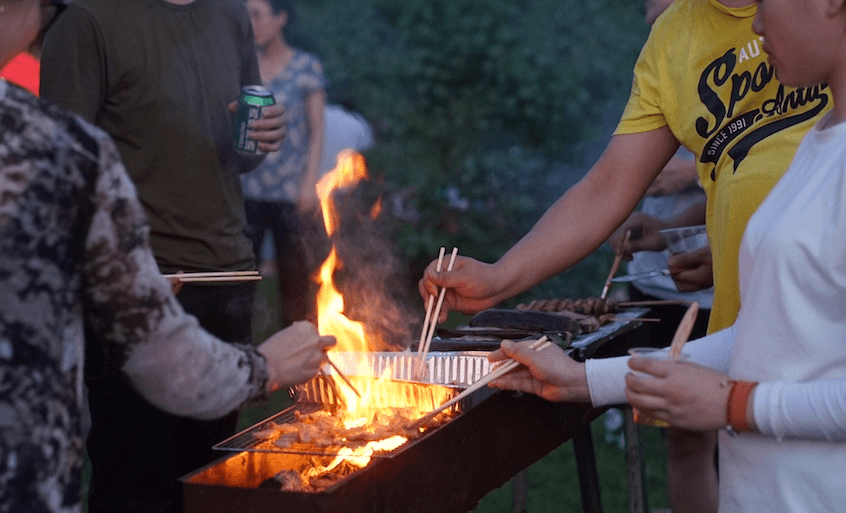The angst of a Wellington winter melts away amid the tongue-tingling tastes of the Middle Kingdom.
You’re in the break room guarding the microwave as your soup-berg slowly circles. Your toast’s just gone down. Pete comes in. You eyeball him: lay down that Vogel’s bro, this needs at least another minute.
The weather’s shit. Work is a painful bloody slog. But you’re open to ideas. And here’s one: Pop your toast, throw it in the bin, and put yourself on a plane to China.
If food is what you love, the Middle Kingdom won’t disappoint.
Right now, the seaside German concession town of Qīngdǎo(青岛)is crawling with seafood. Stone streets are lined with stalls dishing up clams, starfish and kina. The line for pot-stickers snakes around an Old Town alleyway. The long dumplings are the perfect hybrid; both fried and steamed, with a crispy base and soft top. Don’t draw ridicule by asking the lǎobǎn (boss) for vinegar — these parcels of pork and chives are perfect they way they’re served.
Qīngdǎo, the home of Chinese beer, serves its pints in plastic bags so you can slosh your way along the boardwalk and out to the pier backlit by a German-style pavilion.
If you really want to numb your senses, or melt away your winter angst, Chóngqìng hotpot (火锅) with a few báijiǔ (白酒) chasers ought to do it. This famous Sìchuān (四川) má là (麻辣) — numbing and spicy — soup will test your chopstick skills and stain your shirt. Pig skin, fungi, fish, tofu and duck intestines sit skewered in anticipation. Pick your friends carefully, the boiling stock pot is made to be shared.
If you want to be able to read your menu each night, study some Mandarin.
Maybe don’t start with biángbiáng miàn, the famous belt-like noodle from Shǎnxī Province (山西). This dish is famous for being written with the most complicated character in Chinese, with 43 strokes (and that’s simplified!). The hot oil dish laden with pickles will have you questioning whether you ever knew noodles at all.
If you’re looking for some adventure with your meal, China won’t disappoint. There’s a hike, 130km northeast of Běijīng (北京) — out of reach for day-trippers and selfie-seekers — and right now it’s completely deserted.
The trail following the Great Wall of China (长城) between the garrison town of Gǔběikǒu (古北口) and Jīnshānlǐng (金山岭) is still marked by bright pink splotches from a marathon in May.
The seven-hour hike, which winds on and off Qi and Ming Dynasty wall, gives you uninhibited views into ancient Mongol territory. In every direction you’re reminded of your own insignificance and ill-preparedness for a battle of any kind.
Be warned, the Lonely Planet will be useless here. Gǔběikǒu is undergoing an extensive rebuild and most accommodation and restaurants have been bowled.
Leave it too long and you’ll find a China-style Disneyland. Come now, and those remaining guest houses will be ready to welcome you with home-cooked meals of buns (bāozi 包子) and scallion pancake (cōngyóubǐng 葱油饼) for the trail.
If hiking isn’t what you’re into, head south. Throw some bamboo on the bonfire and set up camp on the Li River near the tourist town of Yángshuò (阳朔).
Locals fire up charcoal barbecues loaded with eggplant, whole river carp and lashings of oil and chilli. But don’t expect to go to sleep listening to the clicking of fireflies — open-air karaoke starts as soon as the sun goes down.
Vegetarian? That might have been a challenge 10 years ago. Now, just head northwest to Shangri-la (香格里拉) in Yúnnán Province (云南) through Tea Horse Road outposts like Dàlǐ (大理) and Shāxī (沙溪). Here you’ll find Buddhist, vegetarian and vegan restaurants with mushrooms of every kind, fruit wine and cashew butter.
Now convinced and committed to a life of tea and trade, pack yourself a bag of mántou (馒头), the steamed bun hailing from the north but adored in the south, and start the Silk Road proper.
Following in the footsteps of explorers like Marco Polo, you’ll arrive home — perhaps not within your allocated annual leave period — dressed in fine garments, laden with tea and jewels and stories of camels and caravans.
Sarah Austen-Smith is a Wellington Beltway escapee. She’s travelling through China and Central Asia this year following the Silk Road from Shangri-la to Samarkand.
The Spinoff’s food content is brought to you by Freedom Farms. Our relationship with food, the way we produce it, buy it and eat it, provides wonderful insight into our society and how it works. Freedom Farms reckon talking about food is nearly as much fun as eating it, and they’re excited to facilitate some good conversations around food provenance in Aotearoa New Zealand.





